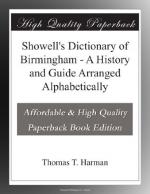Coercive measures were passed at that period even quicker than Government can manage to get them through now a-days, and notwithstanding Mr. Thos. Attwood’s telling Little Lord John that he was “throwing a lighted torch into a magazine of gunpowder” and that if he passed that Bill he would never be allowed to pass another, the Act was pushed through on the 13th of August, there being a majority of thirteen in favour of his Lordship’s policy of policeing the Brums into politeness. The dreaded police force was soon organised under Mr. Commissioner Burges (who was paid the small salary of L900 a year), and became not only tolerated but valued. It was not till some years after, and then in the teeth of much opposition, that the Corporation succeeded in getting into their own hands the power of providing our local guardians of the peace. Mr. Inspector Stephens was the first Chief Superintendent, and in March, 1860, his place was filled by the promotion of Mr. George Glossop. In April, 1876, the latter retired on an allowance of L400 a year, and Major Bond was chosen (June 2nd). The Major’s term of office was short as he resigned in Dec. 1881. Mr. Farndale being appointed in his stead. In May, 1852, the force consisted of 327, men and officers included. Additions have been made from time to time, notably 50 in August, 1875, and so early in 1883, the total rank and file now being 550, equal to one officer for every 700 of population. February 8, 1876, the unpopular Public-house Inspectors were appointed, but two years’ experience showed they were not wanted, and they were relegated to their more useful duties of looking after thieves and pickpockets, instead of poking their noses into private business. In 1868, L200 was expended in the purchase of guns, pistols, and swords for the police and officers at the Gaol. The Watch Committee, in May, 1877, improved the uniform by supplying the men with “spiked” helmets, doubtless to please the Major, who liked to see his men look smart, though the military appearance of the force has been greatly improved since by the said spikes being silvered and burnished.
Political Union.—See “Reform Leagues.”
Polling Districts.—The sixteen wards of the borough are divided into 131 polling districts.
Polytechnic.—This was one of the many local literary, scientific, and educational institutions which have been replaced by our Midland Institute, Free Libraries, &c. It was founded in April, and opened in October, 1843, and at the close of its first year there were the names of very nearly 500 members on the books, the rates of subscription being 6s. per quarter for participation in all the benefits of the institution, including the lectures, library, classes, baths, &c. With the “People’s Instruction Society,” the “Athenic Institute,” the “Carr’s Lane Brotherly Society” (said to have been the first Mechanics’ Institution in Britain), the Polytechnic, in its day, did good work.




